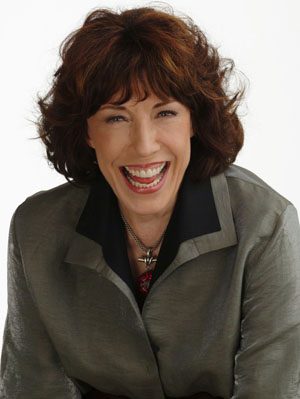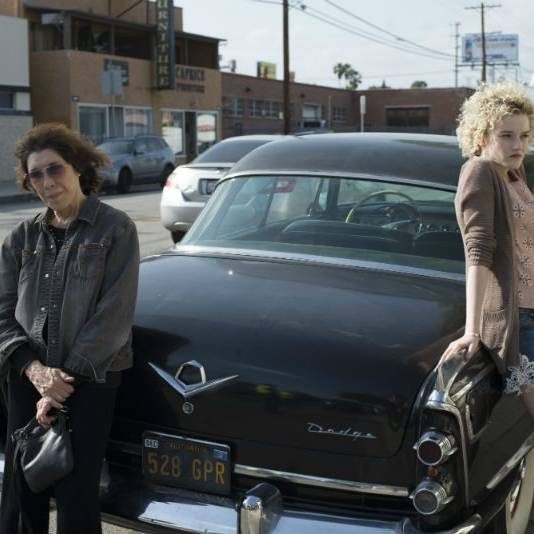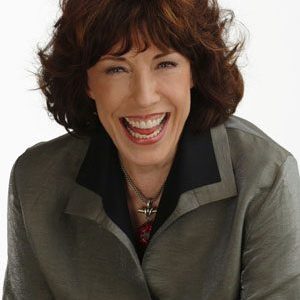
Lily Tomlin is a long-time fan of The Beebo Brinker Chronicles, author Ann Bannon’s 1950s lesbian pulp stories.
Lily, who has a nice Emmy/Tony/Grammy collection to show for her eclectic and electrifying career, jumped on board as executive producer when The Beebo Brinker Chronicles rattled New York stages Off and Off-Off-Broadway in 2007-08.
The first time I picked up one of Bannon’s books a few years ago, I saw Beebo as a brutish butch probably written by a straight man. But it was a different time then, I’ve learned that before people even acknowledge that they were gay, let alone felt gay pride. The publishers required the few lesbian love stories they accepted to end badly for the women in love (suicide, hetero marriage, etc.).
The more upbeat and humorous stage version of Beebo, written by Kate Moira Ryan and Linda S. Chapman, makes its West Coast premiere at the Brava Theater in San Francisco on Feb. 25-March 19. (See www.brava.org for details on the play.) Ann Bannon, who’s 77-years-old, is scheduled to appear at that premiere and during a Feb. 19-March 13 run at Buffalo United Artists Theater.
A Beebo project involving Lily and out TV producer Alan Poul (Six Feet Under), is currently in development at HBO.
A Genuine Ally
Lily Tomlin is 70 years old, but she’s a formidable community spokesperson as well as a beloved entertainer who brings credibility and a smidgen of power to a people (re: LGBT) who still have little in the eyes of much of the nation.
Before a recent Hollywood function, Lily swept into the Hollywood Renaissance Hotel ballroom at Hollywood and Highland, home to the Kodak Theatre and the Academy Awards. The complex was all a-buzz with average Joes and Jills shopping, eating and hanging out while they have the run of the place until Oscar week.
Lily, who once told me she’s “never been in” the closet, is noticeably more outspoken about gay and lesbian causes these days, so I wasn’t surprised when she took the time to offer an opinion about the Prop 8 hearings.
There’s been a lot of debate as to whether or not the timing is right to fight for the right to (a wedding) party. I mention that politicians are gearing up once again to use the LGBT community as a political football.
“What’s new about that?” Lily responds with exasperation. “We’ve been living with that for quite a few terms.”
There’s something gratifying about the “we” comment.
“There’s going to be terrible, heavy-duty, moneyed factions that are all power behind it because their absolute belief system is invested in it.”
I think the public is getting smarter, more conscious, more aware,” she goes on, optimistically. “I don’t think they’re so easily fooled.”
And this turns out to be hauntingly true and troubling.
State after state has shown that voters believe that they have the right and even a duty to dictate whom other people should marry. It doesn’t help that lobbyists and money-bagged blowhards paint a grossly distorted picture of what it means to be gay or what it would look like to have gay marriage.
“But they don’t outnumber people who are descent and understand humanity and have a sense of compassion for other humans,” said Lily, in a tone that sounded reasonable, as she apparently believes most people are.
Lily insists that it’s all about strategy. And we need to use a similar strategy as the moneyed people if we want to have a better chance at influencing the outcome of this battle.
“If we work really hard, look what’s happened in 20 years,” says Lily, optimistically. “We just don’t let them do that … we don’t let them impose their value system on everybody else.”
You get results by letting them know you exist. The squeaky wheel gets the lube, or whatever. So rather than march around Washington or West Hollywood or Peoria, it might be more effective to call, e-mail, write and essentially harass our political representatives. They are so insulated by cozy country clubs, luxury hotels and 5-star restaurants, compliments of corporate donors, that they sometimes forget that they represent ordinary people. People who vote. If we learned nothing else from the Obama presidential election, it should be that the power really does lie in the hands of the people, when they prick up their ears and voice an opinion with their vote.
Lily Tomlin believes that.


